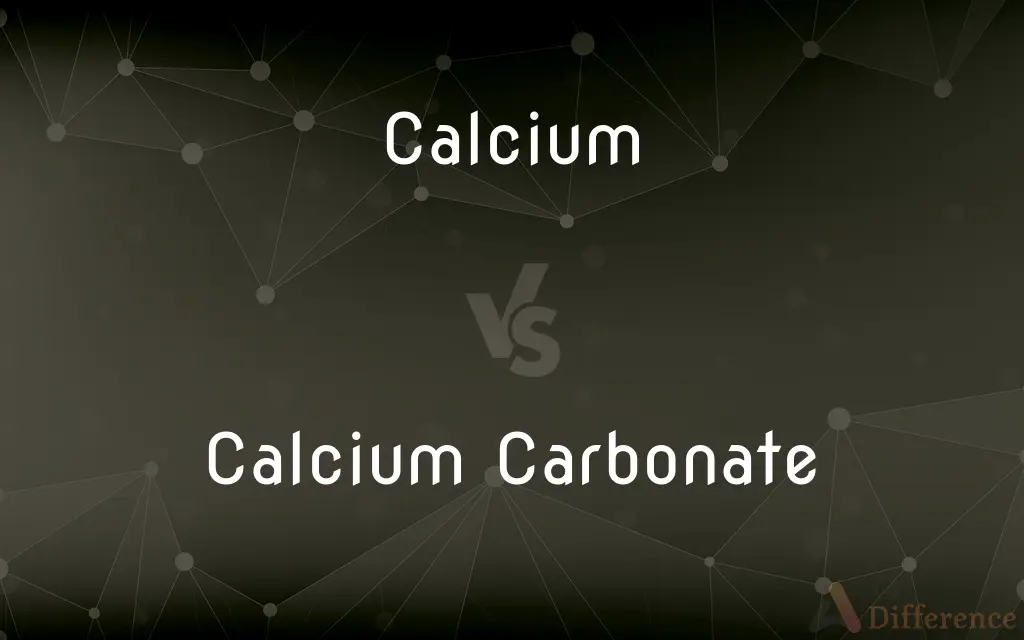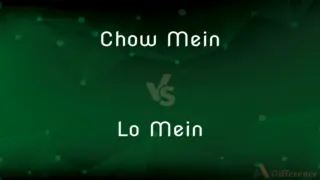Calcium vs. Calcium Carbonate — What's the Difference?
By Tayyaba Rehman — Published on November 5, 2023
Calcium is a silver-white metal and essential mineral in the human body. Calcium Carbonate is a compound consisting of calcium, carbon, and oxygen, often used as a dietary supplement. They differ in elemental composition and applications.

Difference Between Calcium and Calcium Carbonate
Table of Contents
ADVERTISEMENT
Key Differences
Element vs. Compound: Calcium is a chemical element with the symbol Ca and atomic number 20. On the contrary, Calcium Carbonate is a chemical compound with the formula CaCO₃, comprising calcium, carbon, and oxygen.
Occurrence and Extraction: Calcium, in its elemental form, is a soft silver-white metal that's reactive and doesn't appear naturally. Calcium Carbonate, however, is found naturally as minerals like limestone, marble, and chalk.
Applications: While calcium is essential for various biological processes, it's not directly consumed in its metallic form. Calcium Carbonate is widely consumed, especially as an antacid or dietary supplement for calcium intake.
Chemical Properties: Reactivity with acids differs for both. Calcium reacts with acid to produce hydrogen gas, whereas Calcium Carbonate reacts to produce carbon dioxide.
Physical Form: Metallic calcium is solid and shiny. Calcium Carbonate is usually white, powdery, or crystalline in its natural forms like chalk.
ADVERTISEMENT
Comparison Chart
Nature
Element
Compound
Symbol/Formula
Ca
CaCO₃
Natural Occurrence
Doesn't occur naturally due to reactivity
Found in minerals like limestone, marble, and chalk
Uses
Various industrial applications
Dietary supplement, antacid, and in making cement
Reaction with Acid
Produces hydrogen gas
Produces carbon dioxide
Compare with Definitions
Calcium
An alkaline earth metal in the periodic table.
Calcium is found in Group 2 of the periodic table alongside other alkaline earth metals.
Calcium Carbonate
A primary ingredient in antacid products.
For heartburn relief, many people turn to antacids containing calcium carbonate.
Calcium
A vital mineral for human health, crucial for bone formation.
Milk is a good source of calcium, beneficial for bone health.
Calcium Carbonate
A chemical compound with the formula CaCO₃.
Chalk is primarily composed of calcium carbonate.
Calcium
An essential component in various biological processes.
Calcium plays a key role in muscle contraction and nerve transmission.
Calcium Carbonate
Found naturally in minerals like limestone.
Marble is a form of limestone that's been metamorphosed, both having calcium carbonate.
Calcium
The fifth most abundant element in the Earth's crust.
Although calcium is abundant, it doesn't occur freely due to its reactivity.
Calcium Carbonate
Acts as a base in various chemical reactions.
Calcium carbonate reacts with acid to produce carbon dioxide, water, and calcium salt.
Calcium
A chemical element with symbol Ca.
Pure calcium is a shiny metal, though it's rarely seen in this form.
Calcium Carbonate
Used as a calcium supplement.
People with calcium deficiencies often take calcium carbonate pills.
Calcium
A silvery, moderately hard alkaline-earth metal that constitutes approximately 3.6 percent of the earth's crust and is a basic component of most animals and plants. It occurs naturally in limestone, gypsum, and fluorite, and its compounds are used to make plaster, quicklime, Portland cement, and metallurgic and electronic materials. Atomic number 20; atomic weight 40.08; melting point 842°C; boiling point 1,484°C; specific gravity 1.54; valence 2. See Periodic Table.
Calcium
The chemical element (Symbol Ca), with an atomic number 20. It is a soft, silvery-white alkaline earth metal which occurs naturally as carbonate in limestone and as silicate in many rocks.
Calcium
(countable) An atom of this element.
Calcium
An elementary substance; a metal which combined with oxygen forms lime. It is of a pale yellow color, tenacious, and malleable. It is a member of the alkaline earth group of elements. Atomic weight 40. Symbol Ca.
Calcium
A white metallic element that burns with a brilliant light; the fifth most abundant element in the earth's crust; an important component of most plants and animals
Common Curiosities
Can you find pure calcium in nature?
No, due to its reactivity, calcium doesn't occur freely in nature.
What happens when calcium carbonate reacts with acid?
Calcium carbonate reacts with acid to produce carbon dioxide, water, and a calcium salt.
Why is calcium carbonate added to some foods?
It's added as a firming agent, color retainer, or to enrich the product with calcium.
Is calcium the same as calcium carbonate?
No, calcium is an element, while calcium carbonate is a compound containing calcium, carbon, and oxygen.
What are the primary sources of calcium carbonate?
Limestone, marble, and chalk are natural sources of calcium carbonate.
Why is calcium essential for humans?
Calcium is vital for bone and teeth formation, muscle contraction, and nerve signaling.
Is chalk pure calcium carbonate?
Chalk is primarily calcium carbonate, but it can contain impurities.
Can you consume metallic calcium?
No, metallic calcium is not suitable for consumption. Calcium in dietary supplements is often in forms like calcium carbonate.
Do seashells contain calcium carbonate?
Yes, seashells primarily consist of calcium carbonate.
Which is commonly used as a dietary supplement, calcium or calcium carbonate?
Calcium carbonate is commonly used as a dietary supplement.
What is the role of calcium in plants?
Calcium is crucial for cell wall formation and stability in plants.
Is calcium carbonate harmful to consume?
In appropriate amounts, it's safe. Excessive intake may lead to side effects.
Can calcium carbonate be dissolved in water?
It's poorly soluble in water but can dissolve in acid.
Can calcium carbonate be used to neutralize acid?
Yes, calcium carbonate can neutralize acid, which is why it's used in antacids.
Which is more abundant in the Earth's crust, calcium or calcium carbonate?
Calcium is the fifth most abundant element, but it's mainly found as compounds like calcium carbonate.
Share Your Discovery

Previous Comparison
Chow Mein vs. Lo Mein
Next Comparison
Inc vs. LtdAuthor Spotlight
Written by
Tayyaba RehmanTayyaba Rehman is a distinguished writer, currently serving as a primary contributor to askdifference.com. As a researcher in semantics and etymology, Tayyaba's passion for the complexity of languages and their distinctions has found a perfect home on the platform. Tayyaba delves into the intricacies of language, distinguishing between commonly confused words and phrases, thereby providing clarity for readers worldwide.













































